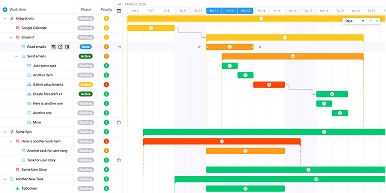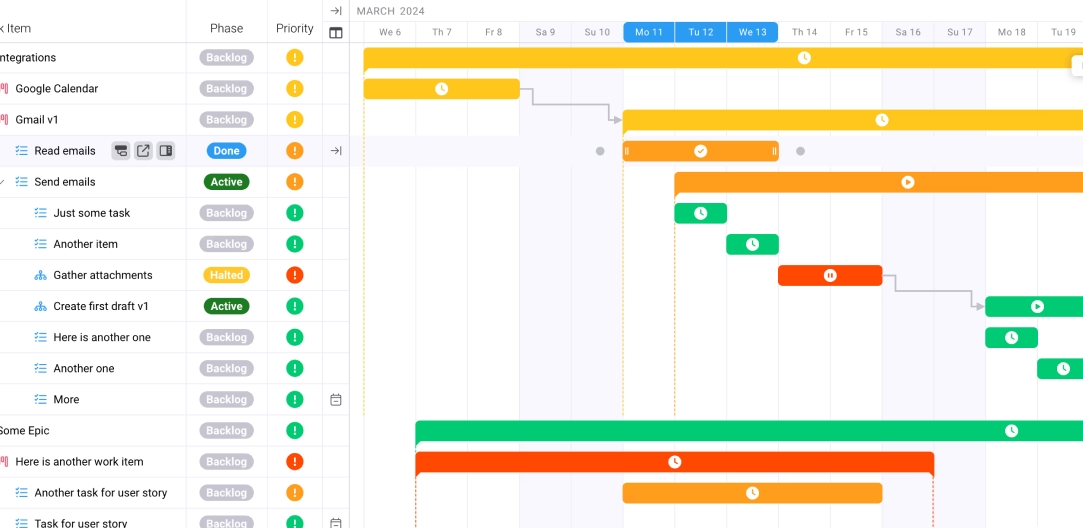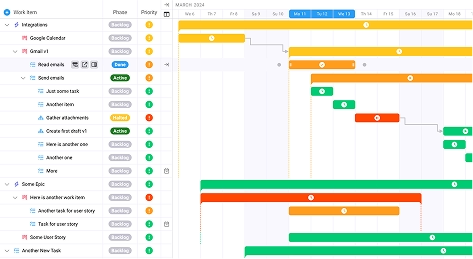
How Ravetree Streamlines Marketing Campaigns
Key takeaways:
- Modern marketing campaigns fail due to fragmented workflows, poor resource allocation, and inadequate performance tracking across multiple channels and stakeholders
- A unified work management approach integrates project coordination, resource planning, client communication, and real-time analytics into a single operational framework
- Strategic campaign orchestration reduces execution time by 40-60% while improving ROI measurement accuracy and cross-functional team collaboration
- Future-ready marketing operations require AI-enhanced automation, advanced attribution modeling, and agile methodologies to navigate increasing complexity and privacy regulations
Most marketing teams believe that throwing more resources at their campaigns will automatically improve results. Yet 83% of marketing leaders now prioritize demonstrating ROI as their top concern—a dramatic shift from just five years ago. This paradox reveals a fundamental flaw in how modern organizations approach marketing campaigns: they’re optimizing for activity instead of outcomes. How Ravetree Streamlines Marketing Campaigns represents a paradigm shift from chaotic execution to strategic orchestration, transforming scattered efforts into cohesive, measurable success stories.
The Current Challenge: Marketing Campaign Chaos
Marketing campaigns face unprecedented complexity in 2025, with teams juggling multiple channels, evolving privacy regulations, and mounting pressure to demonstrate measurable ROI. The traditional approach of managing campaigns through disparate tools and disconnected processes has created what industry experts call “marketing operation fragmentation.”
This fragmentation manifests in several critical ways. First, data privacy regulations like GDPR and CCPA have made it increasingly difficult for marketers to collect and leverage quality customer data, forcing teams to operate with incomplete information while maintaining compliance across multiple jurisdictions. Second, the average marketing department uses 91 different software tools, creating data silos that prevent comprehensive campaign analysis and optimization.
The consequences are severe. Customer acquisition costs have risen by 222% over the past decade, while marketing teams struggle to attribute results to specific campaign elements. This challenge is particularly acute for professional services firms—marketing agencies, consulting firms, accounting practices, and IT services companies—where campaign success directly impacts client retention and business growth.
The root cause isn’t lack of talent or budget; it’s the absence of integrated systems that can orchestrate complex, multi-stakeholder campaigns from conception to completion. Teams spend 40% of their time on administrative tasks rather than strategic activities, while project delays cascade through interconnected campaign elements, causing missed deadlines and budget overruns.
The Strategic Framework: Unified Campaign Orchestration
Successful marketing campaign management requires a fundamental shift from tool-centric to process-centric thinking. The unified campaign orchestration framework integrates five critical components: strategic planning, resource allocation, execution management, performance tracking, and stakeholder communication.
This framework recognizes that marketing campaigns are not isolated projects but interconnected systems that require seamless coordination across multiple touchpoints. Modern personalization strategies show that 89% of marketers witness improved returns when incorporating personalized elements into their campaigns, but this level of customization demands sophisticated project coordination capabilities.
The orchestration approach begins with centralized campaign planning, where all stakeholders—creative teams, account managers, developers, and executives—collaborate within a shared workspace. This eliminates the common scenario where creative briefs, technical specifications, and client feedback exist in separate systems, creating version control issues and communication gaps.
Resource planning becomes dynamic rather than static, with real-time visibility into team capacity, skill sets, and availability. This prevents the all-too-common situation where campaigns stall because key team members are overallocated or unavailable when needed. Advanced project management methodologies enable marketing teams to balance multiple concurrent campaigns while maintaining quality standards and meeting deadlines.
Performance tracking extends beyond traditional metrics to include process efficiency, resource utilization, and stakeholder satisfaction. This comprehensive approach provides the data needed to optimize not just campaign content but also operational workflows, creating compounding improvements over time.
Implementation Tactics: Streamlining Campaign Execution
Centralized Campaign Planning and Brief Management
Modern marketing campaigns require detailed coordination between creative, technical, and strategic teams. Successful implementation begins with establishing a centralized brief management system where all campaign requirements, timelines, and deliverables are documented and accessible to all stakeholders.
This centralized approach eliminates the common problem of scattered campaign information across multiple email threads, shared drives, and project management tools. Digital marketing trends for 2025 emphasize the importance of agile campaign development, which requires real-time collaboration capabilities that traditional document-sharing methods cannot support.
The brief management process should include automated approval workflows that route campaigns through appropriate stakeholders based on budget thresholds, client requirements, and regulatory considerations. This prevents delays caused by unclear approval processes while maintaining necessary oversight and quality control.
Resource Allocation and Capacity Management
Marketing teams using data-driven strategies report that 30.55% find data most valuable for determining effective marketing strategies, while 29.59% use it primarily for improving ROI. This data-centric approach extends to resource management, where teams need real-time visibility into capacity, skills, and availability.
Effective resource planning prevents the common scenario where campaigns are delayed because key team members are overbooked or unavailable. Advanced planning tools provide visual capacity management, showing exactly when team members are available for new projects and identifying potential bottlenecks before they impact campaign timelines.
The resource management approach should include skill-based allocation, ensuring that campaigns are staffed with team members who have the specific expertise required for success. This is particularly important for complex, multi-channel campaigns that require specialized knowledge in areas like marketing automation, data analysis, and regulatory compliance.
Automated Workflow and Task Management
Email marketing campaigns generate an average ROI of 4200%, but this success depends on precise execution timing and coordination across multiple team members. Automated workflow management ensures that campaign tasks are executed in the correct sequence, with appropriate handoffs between team members and stakeholders.
Automated workflows should include trigger-based task creation, where completing one campaign element automatically generates subsequent tasks for other team members. This eliminates manual task management overhead while ensuring that campaign momentum is maintained throughout the execution process.
The workflow system must accommodate the iterative nature of modern marketing campaigns, where client feedback, performance data, and market conditions require rapid adjustments to campaign elements. Agile marketing methodologies enable teams to adapt quickly while maintaining overall campaign coherence and quality standards.
Real-Time Performance Tracking and Analytics
Campaign success requires continuous monitoring of both performance metrics and operational indicators. Video marketing statistics show that digital video viewership grew from 2.78 billion users in 2019 to 3.88 billion by 2024, highlighting the need for multi-channel performance tracking capabilities.
Real-time analytics should integrate campaign performance data with operational metrics like task completion rates, resource utilization, and client satisfaction scores. This comprehensive view enables teams to identify optimization opportunities at both the campaign and process levels.
The analytics framework must support attribution modeling that connects campaign activities to business outcomes. Marketing mix modeling helps organizations optimize budget allocation across different channels while providing the ROI visibility that executive stakeholders require for budget approval and resource allocation decisions.
Client Communication and Approval Management
Professional services firms must maintain transparent communication with clients throughout the campaign development and execution process. Client portal functionality enables controlled access to campaign progress, deliverables, and performance data without overwhelming clients with operational details.
The communication system should include automated status updates that keep clients informed of campaign progress while reducing the administrative burden on account management teams. This proactive communication approach prevents the common problem of clients feeling disconnected from campaign development, which can lead to last-minute change requests and project delays.
Approval management becomes critical for maintaining campaign timelines while ensuring client satisfaction. Streamlined approval processes with clear deadlines and escalation procedures prevent campaigns from stalling while waiting for stakeholder feedback and authorization.
Measuring Success: KPIs and Metrics That Matter
Campaign measurement extends far beyond traditional marketing metrics to include operational efficiency, resource utilization, and stakeholder satisfaction indicators. Modern marketing measurement approaches recognize that campaign success depends on both external performance and internal operational effectiveness.
Primary performance metrics should include campaign ROI, customer acquisition cost, lifetime value impact, and attribution across all touchpoints. However, these external metrics must be complemented by operational indicators that reveal process efficiency and team productivity.
Operational metrics include campaign delivery timeliness, budget adherence, resource utilization rates, and stakeholder satisfaction scores. These indicators provide early warning signs of operational problems that could impact campaign performance and client relationships.
Time tracking capabilities enable precise measurement of campaign profitability by connecting time investment to campaign outcomes. This granular visibility supports both campaign optimization and business development decision-making, helping teams identify the most profitable campaign types and client relationships.
Advanced measurement includes predictive analytics that use historical campaign data to forecast future performance and identify optimization opportunities. This forward-looking approach enables proactive campaign management rather than reactive problem-solving.
The measurement framework should support both campaign-specific analysis and portfolio-level insights that reveal patterns across multiple campaigns and clients. This macro-level visibility enables strategic decision-making about service offerings, pricing models, and resource investment priorities.
Future Considerations: Emerging Trends and Next Steps
Marketing trends for 2025 indicate that 68% of marketers are positive about generative AI integration, while 59% are excited about its potential impact on campaign development and execution. This technological evolution will require marketing operations platforms that can integrate AI-powered tools while maintaining human oversight and quality control.
The future of marketing campaign management will be characterized by increased automation, enhanced personalization, and more sophisticated attribution modeling. Nano- and micro-influencer marketing trends suggest that campaign complexity will continue to increase as brands work with more diverse content creators and distribution channels.
Privacy regulations will continue evolving, requiring marketing operations systems that can adapt to changing compliance requirements without disrupting ongoing campaigns. The most successful organizations will be those that build flexibility and adaptability into their campaign management processes from the beginning.
AI-driven marketing strategies will transform campaign development, enabling more sophisticated testing, optimization, and personalization than previously possible. However, this technological capability must be balanced with human creativity and strategic thinking to create campaigns that truly resonate with target audiences.
The integration of emerging technologies like augmented reality, voice search optimization, and advanced chatbots will require marketing operations platforms that can accommodate new campaign types and measurement approaches. Teams that prepare for these technological shifts will be better positioned to leverage new opportunities as they emerge.
Future campaign management success will depend on building systems that are both sophisticated enough to handle complex, multi-channel campaigns and flexible enough to adapt to rapidly changing market conditions and technological capabilities.
Conclusion
The transformation from chaotic campaign execution to strategic orchestration requires more than new tools—it demands a fundamental reimagining of how marketing teams collaborate, measure success, and deliver value to clients and stakeholders. How Ravetree Streamlines Marketing Campaigns by providing the integrated foundation that modern marketing operations require: centralized planning, dynamic resource management, automated workflows, real-time analytics, and seamless stakeholder communication.
Organizations that embrace unified campaign orchestration will not only improve their immediate marketing campaigns but also build the operational capabilities needed to thrive in an increasingly complex and competitive landscape. The future belongs to marketing teams that can execute with precision while adapting with agility—exactly what integrated work management platforms make possible.









